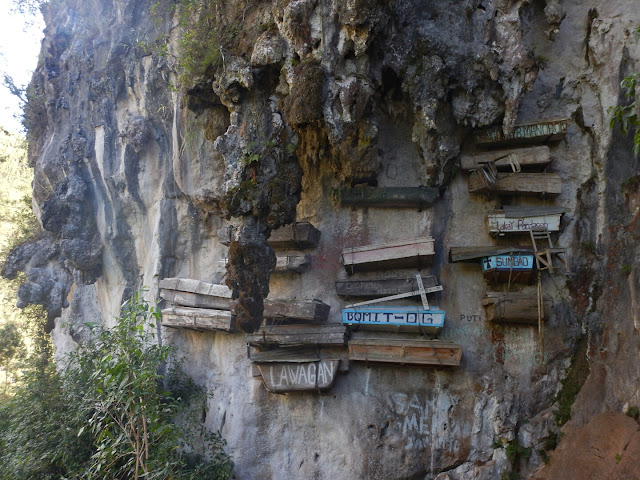A gem in the north of Philippines
We found a lovely little place up in the mountains in the north of Philippines called Sagada. Unless you like hiking this is not the place for you. Located on a hill, the little village itself consists of slopes and staircases. We found an amazing homestay called Sagada Homestay at the top of the village with great views of the centre and the mountains. We paid 900P (170 SEK/ €17) for a room that sleeps three.
You have to pay a 35P (7 SEK/€0.70) environmental fee and register on arrival at the tourist centre. They also require you to hire a guide as they want to keep track of the tourists and make sure the surrounding areas are not ruined. Though we spoke to a few local tourists that said they had just gone on their own. But one other reason why they want you to go with a guide is because some of the coffins in the graveyard has been opened by curious tourists so they obviously want to make sure that the graves are respected and left alone.
We went on an Eco-Tour (the cheapest one at 600P (110 SEK/€11) per guide. He took us up past the Christian graveyard and up to the traditional gravesite: the hanging coffins. He told us about the history of Sagada and thay most of the people there has been Christianised yet still believes in the traditional ways. For example, when someone dies they can either be burried in the public Christian graveyard or in a hanging coffin up on a hillside. It is up to the family to decide how the person should be burried.
The site itself has no significant purpose, they just need to be sheltered from the rain. It is estimated that the oldest coffin is about 400-500 years old so as long as it remains untouched it can be there for many many years to come. It is said that the reason they choose this way of burial is because they believe they will be surronded only by darkness if they are put in the ground.
The traditional ways are still very strong in Sagada and they for example believe that once you are married, you stay married. If you do get a divorce, they give you a special plate at family gatherings that no one else will eat from, as you will be seen as dirty.
We walked through coffee plantations (where Therese considered stealing some beans to brew her own morning coffee but showed great restraint). Crossed streams by balancing our way across on rocks.
Went through a cave and up and down the mountain.
We crossed rice fields and ended up at a little waterfall as well.
The walk was meant to take 3 hours but our guide practically ran up and down the mountain with a cigarette in hand and not even breaking a sweat whilst we were struggling to breath and were soaking wet, so it only took us 1.5 hour.
You have to pay a 35P (7 SEK/€0.70) environmental fee and register on arrival at the tourist centre. They also require you to hire a guide as they want to keep track of the tourists and make sure the surrounding areas are not ruined. Though we spoke to a few local tourists that said they had just gone on their own. But one other reason why they want you to go with a guide is because some of the coffins in the graveyard has been opened by curious tourists so they obviously want to make sure that the graves are respected and left alone.
We went on an Eco-Tour (the cheapest one at 600P (110 SEK/€11) per guide. He took us up past the Christian graveyard and up to the traditional gravesite: the hanging coffins. He told us about the history of Sagada and thay most of the people there has been Christianised yet still believes in the traditional ways. For example, when someone dies they can either be burried in the public Christian graveyard or in a hanging coffin up on a hillside. It is up to the family to decide how the person should be burried.
The site itself has no significant purpose, they just need to be sheltered from the rain. It is estimated that the oldest coffin is about 400-500 years old so as long as it remains untouched it can be there for many many years to come. It is said that the reason they choose this way of burial is because they believe they will be surronded only by darkness if they are put in the ground.
The traditional ways are still very strong in Sagada and they for example believe that once you are married, you stay married. If you do get a divorce, they give you a special plate at family gatherings that no one else will eat from, as you will be seen as dirty.
We walked through coffee plantations (where Therese considered stealing some beans to brew her own morning coffee but showed great restraint). Crossed streams by balancing our way across on rocks.
Went through a cave and up and down the mountain.
We crossed rice fields and ended up at a little waterfall as well.
The walk was meant to take 3 hours but our guide practically ran up and down the mountain with a cigarette in hand and not even breaking a sweat whilst we were struggling to breath and were soaking wet, so it only took us 1.5 hour.










Comments
Post a Comment